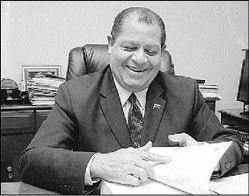
Minister of Finance and the Public Service Audley Shaw browses through the 2008/2009 Estimates of Expenditure to be tabled in Parliament today. - Peta-Gaye Clachar/Staff Photographer
The country will see a significant jump in the size of the budget for the 2008/2009 fiscal year, bringing it closer to the $500 billion mark, when the Estimates of Expenditure are tabled in Gordon House today.
Minister of Finance and the Public Service Audley Shaw has said additional debt servicing requirement for the new financial year would be almost $55 billion.
In the 2007/2008 budget, debt servicing requirements stood at $203.5 billion.
The last of the two supplementary estimates of expenditure tabled by Shaw increased the 2007/2008 budget to $405.2 billion, moving from the $380.3 billion crafted by Dr Omar Davies, the previous finance minister, at the start of the last fiscal year.
However, according to a source close to the administration, the additional debt servicing cost, as well as hospital user fees, constituency development fund, additional wages for MOU3 and additional capital expenditure have increased the overall budget to close to $500 billion.
Yesterday, Shaw refused to confirm the figure but told The Gleaner that if the current administration did not take strong corrective action, the fiscal deficit out-turn would be about 7.5 per cent of GDP.
Small miracle
He said the Government achieved a "small miracle in containing the fiscal deficit to 5.5 per cent of GDP", one per cent above the original target of 4.5 per cent set by the previous administration.
Shaw noted his ministry had to deal with the additional $16 billion which was not included in the budget.
With this budget, a Jamaica Labour Party administration will, for the first time since 1988, determine how the country's money will be spent.
Shaw will table the 2008-2009 Estimates of Expenditure in Parliament, hours after the Bruce Golding administration signals its programmes for the year in the Throne Speech to be delivered by Governor General Sir Kenneth Hall.
The Golding administration added just under $25 billion to the budget for the 2007-2008 fiscal year, after it took over the reins of power following last September's general elections.
With inflation for this fiscal year expected to be around 18 per cent, and further increases in oil prices projected, the administration will be hard-pressed to present a budget which meets the needs of the country, while taking into account the resource constraint.
In a national address recently, Golding made it clear the administration was facing several challenges in crafting the budget.
However, he argued, the finance ministry had come up with a credible budget.
According to Golding, his administration would be moving decisively to deal with the country's fiscal deficit.
| The national debt at December 2007 (J$b): | | |
| Domestic | 558.43 | |
| External | 432.37 | |
| Total | 990.80 | |
| Owed to selected foreign |
| governments and other |
| entities (J$b): | | |
| Note: Figures relate to the debt as at March 31, 2007: | | |
|
| United States | 18.05 |
| Canada | 0.56 |
| China | 1.78 |
| United Kingdom | 1.93 |
| Germany | 4.48 |
| Japan | 10.82 |
| Netherlands | 2.03 |
| Venezuela | 0.88 |
| France | 0.47 |
| Iraq | 1.40 |
| Belgium | 2.21 |
| Italy | 0.64 |
| Norway | 0.17 |
| Kuwait | 1.57 |
| Brazil | 0.07 |
| GOJ Global Bond holders | 222.59 |
| Other commercial entities | 9.94 |
| IDB | 36.11 |
| World Bank/IBRD | 25.51 |
| CDB | 7.50 |
| EU Commission et al | 4.604 |

